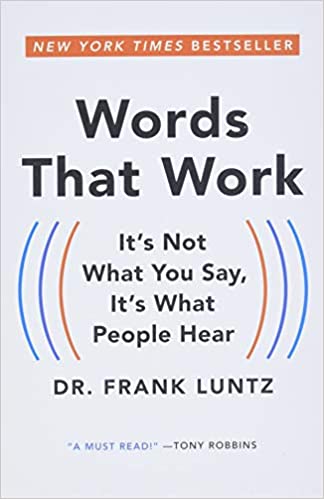If you want to succeed in political campaigning and lobbying, you’ll have read Frank Luntz.

There are some words and phrases that land and others that lead people to shut down.
Some words and phrases attract support in some political groups and lead others to revulsion.
Political Babel
If you are not interested in winning, you should not read Frank Luntz, let alone taking on board his advice.
I’ve always been perplexed by why different interests use their own tribal language. They use this language when they are speaking amongst themselves, and when speaking to people outside their tribe.
It’s something that’s been going on for a long time. I don’t see any signs of it changing.
There is just one issue with this approach. It is just not effective at communicating.
You could speak to me in German and I may well pick up some words by way of some poor Dutch I possess. But, if you want to tell me something, I’d recommend some mid-Atlantic English.
I’ve noticed that some words and phrases tend to annoy any centrist/centre-left politicians, including, but not limited to “innovation principle”, “hazard v risk”, “this will lead me to move my operations out of Europe”.
The reaction is deeper. Whatever good points were made are now forgotten, and your whole position put on a heap of “don’t support”.
Even when the political winds have spoken and support for a position is firmly rejected, some people seem unable to move on.

From today’s FT, Big Tech attacks tough EU measures aimed at tackling its market power Apple and Google criticise newly unveiled Digital Markets Act that will force a radical overhaul of their global operations.
What can you do
I think the trick is to use words and phrases that get you the support and votes for your position.
If it means adapting the words you use to make your position, so be it. You are not changing your position, just the words you use to less value-laden words and phrases.
Indeed, the most successful campaigning and lobbying outfits I know, refine this and adapt the language they for the key political groups. It’s a technique I’ve used with clients who were serious about winning and happy enough to communicate their case in words that resonated with the audience they were speaking with.
Before you go out and start lobbying, it is usual to test if your position lands. At the same time, it makes sense to see if the language you are using is winning people over or leading people to drop their support.
You need to be unemotional in this exercise. If the words and phrases you use lead to support going away, stop using them, and find other words that work.
I’ve never had any issue doing this, but many do. After canvassing in a few election campaigns, I realised the smart thing was not to say things to potential voters that annoyed them. Focus on what spoke to them, in words that resonated with them. Drop the psychological blocks. If you can’t, don’t be surprised when you don’t get the law you wanted.
That technique is explained here: